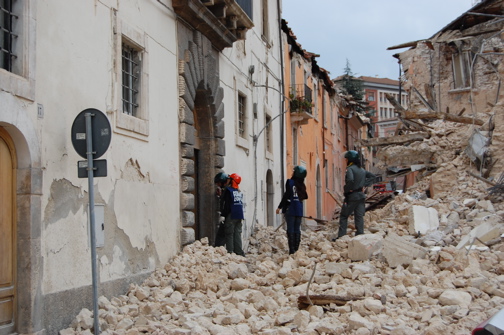Today is the national day of mourning for the victims of the severe earthquake that hit the Italian region of Abruzzo on April 6.
Media coverage of the earthquake has been one of the main protagonists of this tragic event.
Thanks to cameras in the house of the Reality Show The Big Brother, it has been even possible to witness human natural reaction to an unexpected natural event surged in the middle of the night. Walls and furniture were shaking as people ran off their bed unaware of what was going on. Television fulfilled our curiosity of seeing live what we had wondered about when visiting Pompei…
Right after the earthquake shook Abruzzo, journalists and photographers of any channel, nationality, radio station and newspaper started to pour in the area in search for images and stories, stories and stories of what it has become “the greatest natural disaster that has hit Italy in this Millennium”.

The courage of rescue teams, the dignity of who has lost it all, the tears and pain of those who have survived their loved ones, the faces between joy and disbelief when people were found alive after two days spent under the rubbles; all this has been filmed, told, displayed, dismembered and explained. Experts of all sides have been convened to make plain of what happened, what could have been prevented and what lies ahead.
Days go by and the nightmare seems endless as the earth keeps shaking, but material, economic and psychologic damage is already visible. The aftershock is even stiffer. As it always happens in situations of need, people are trying to make ends meet using any mean. So, the black market for food and basic products materialised in a matter of hours, burglaries in the abandoned unsafe buildings demanded the intervention of police forces to seal the area and loan sharks started to make business. Yes, because, as Marco Travaglio said in the aftermath of the earthquake, “emergencies are business” (click here to see the whole video). From media coverage to banking loans without forgetting political never-ending search for votes, there lies an entire system hungry for opportunities to be found thanks to people’s weaknesses.
The human race for survival: basic needs reveal human beings’ animal side. However, animal insticts also resulted in great displays of solidarity and dignity. Volunteers dig in the ruins and played with children, tons of food were delivered and distributed, chemists’ supplied drugs 24/7 and people offered to host the homeless. The Italian people stood up for themselves, collaborated and worked together.
Italy is not new to natural disasters. We are out of cyclones and hurricane ordinary trajectories, but the country is regularly hit by floods, earthquakes, volcanic eruptions and snow storms. Indeed, as shown in the map below, Italy lies on geological fault lines and it is therefore largely exposed to tremors of the earth’s surface.
This latest catastrophe brought to light current and older controversies such as the government housing plan, the return to nuclear power and main infrastructure projects under way. It has been claimed that it is not sustainable to launch such projects in a country that is geologically subject to seisms and floods. In fact, effort should be made in renovating historic city centres, in strengthening existing structures and in investing in renewable energy. Projects such as the bridge on the Messina strict is likely to become an architectural monstruosity unsustainable for the environment and a black hole that swallows economic resources and feeds corruption and money laundering. This one and many similar projects should be forgotten for the sake of the country.

History shows that victims of natural disasters tend to be forgotten and usually live in temporary tented camps for years, struggling to be allocated the resources they were promised when the catastrophe occured. But that’s also part of human nature: disposable acts and images to satisfy present needs i.e. hunger for morbidness and for opportunities.
Despite rescuers, volunteers and local people’s strength and impressive work demonstrated in this tragedy, the media and the political world are showing once again that nothing matters but images, symbolic acts, private stories publicly displayed to raise the audience share and votes, votes, votes. (We better not forget that the government is currently undergoing deep internal rupture for the recently introduced security measures and a lot of opposition for draft legislation on housing, the economic crisis and the environment just to mention a few of the major issues in exam.)
Ironically enough, probably the images shot live at the Big Brother are the only objective evidence of human reaction during an earthquake, leaving out all the sensational and gloomy stories that came after. But when the wave of sensationalism will be over and people’s complaints will no longer be listened to, there will still be the country’s deeply damaged artistic heritage to objectively proof Italy’s gradual lethal drowning into superficiality.
